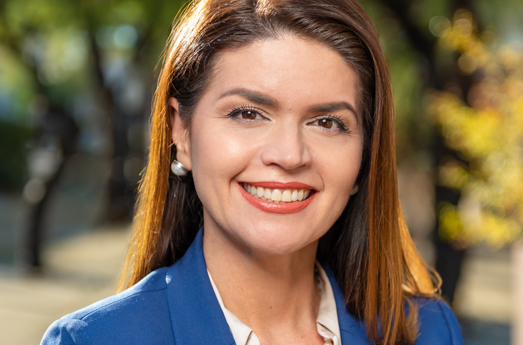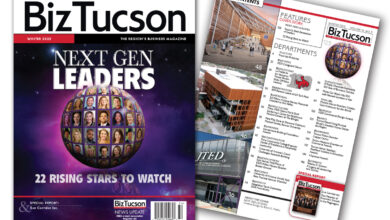
Mayor Regina Romero
Leading During COVID-19
By David Pittman
Just three short months after taking the top leadership role in Tucson city government, Mayor Regina Romero found herself grappling with troubling issues involving a frightening and deadly virus called COVID-19 that spread swiftly from person to person, country to country and continent to continent as it evolved into a global pandemic.
During the mayoral election, Romero – the first female mayor in Tucson history – campaigned for bold action on climate change, more affordable housing, increased infrastructure investment and expansion of immigrant and worker rights, but protecting the public health of residents from the spread of the coronavirus wasn’t discussed in the campaign.
Nonetheless, Romero is receiving praise for the leadership she showed and the policies she implemented in order to protect the public health of residents as the disease descended here.
Mayor Romero declared a local emergency on March 17, announcing a new set of actions the City of Tucson was taking to prevent the spread of COVID-19.
“This morning, after consulting with business stakeholders, the city attorney and city manager, I have made the determination that it is the best interest of maintaining public health to suspend dine-in services in restaurants and food courts, and transition to only delivery/pickup services,” Romero said. “Bars, gyms and other specific venues stated in the proclamation where groups of people congregate are directed to be closed. At this time, the best thing we can do is come together as a community and take care of each other.”
In addition, Romero ordered that:
• All service counters and lobbies within City of Tucson buildings, including ward offices and City Hall, be closed, while the city continued services and operations electronically.
• There would be no interruption in trash, recycling, land or water services.
• All evictions on city-owned public housing and all water shutoffs be temporarily suspended.
On March 27, Mayor Romero implemented new orders to slow the spread of COVID-19 and, in the process, broke away from a decision made by Arizona Gov. Doug Ducey. The Republican governor had proclaimed that businesses he deemed “essential” could continue operating, while those he found “unessential” should be closed temporarily.
Romero disagreed with Ducey’s ruling that spas, barbershops, and hair and nail salons were essential and strongly urged that “operations of personal hygiene and other services that conflict with CDC social distancing guidelines and jeopardize public health” should be closed until further notice.
Romero said she never makes public policy decisions in a vacuum and always takes a collaborative approach. She said she regularly consults with City Manager Michael Ortega, City Attorney Mike Rankin, Pima County officials, Vice Mayor Paul Cunningham and other City Council members, the Arizona congressional delegation, as well as, Tucson business and community leaders.
“Because of my three terms on the City Council, I know how the city works and the importance of touching all the bases,” she said. “As mayor, I’ve taken a coordinated approach from the beginning and I’ll continue to do so.
“Asking people to stay at home and practice social distancing wasn’t easy. It’s been very harmful to businesses and our economy, but we had to do something to reduce the spread of this disease. If we had not responded appropriately, our economy would have suffered more harm over the long term.”
Former Tucson Mayor Jonathan Rothschild said Romero’s public statements and actions as mayor regarding COVID-19 policy were very appropriate. He also said Romero “has a number of issues she wants to bring to the forefront and she is aware that to make progress in those areas the city must have a friendly business climate and a strong economy in order to produce the revenue needed to adequately provide city services.”
Amber Smith, president and CEO of the Tucson Metro Chamber, said Romero “was forced to face formidable challenges in dealing with a global pandemic and she did so with grace and courage, and stuck to her convictions in representing the interests of the community.”
Allyson Solomon, executive director of Metropolitan Pima Alliance, thanked Romero and the Tucson City Council for addressing “specific and urgent business and development community needs” during a worldwide pandemic.
“Under Mayor Romero’s leadership, the council supported the lifting of restrictions on temporary signs that allowed businesses to quickly and lawfully advertise new services,” Solomon said. “In addition, the council proactively reduced development impact fees for the next two years, which will aid in the economic recovery of our city.”





